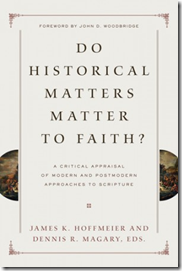Several dozen helpful articles are included in the recent work edited by James K. Hoffmeier and Dennis R. Magary, Do Historical Matters Matter to Faith?: A Critical Appraisal of Modern and Postmodern Approaches to Scripture. In one of the articles, Michael G. Hasel addresses the lack of evidence for the United Monarchy in Israel. I thought that the points were worth sharing.
1. The heartland of the kingdom of David and Solomon is largely inaccessible to archaeologists because of the political situation in Judea and Samaria (the “West Bank”).
2. Of the sites excavated, many have not been fully published. Jerusalem is one such example.
3. Archaeological remains have faced massive destruction over the centuries.
4. The ancient peoples left limited texts to help us assess what they left behind.
5. Interpretations are tentative and can change within a season. Hasel cites the discovery of the Tel Dan Inscription against those who were then claiming that David and his kingdom were mythical.
For development of each point, see “New Excavations at Khirbet Qeiyafa and the Early History of Judah,” pages 477-96 in the book. For a full list of articles, see this previous post. The paperback sells for $23, and the Kindle version is under $10.
2 thoughts on “Why Is There Little Evidence for David’s Kingdom?”
1. Jerusalem is accessible to Israeli archaeologists. Besides, pre-1993 surveys and excavations have still revealed much about 11th-10th C BC Benjamin and Judah.
2. True, but this obstacle is not insurmountable-the partial publication of material that we have is much better than no publication at all.
3. Not typically applicable. The Middle Bronze city wall of Jerusalem has not totally and magically disappeared.
4. Very true a good portion of the time. We must use the very limited contemporary textual data we have the best we can.
5. The Tel Dan stele mention of the House of David only demonstrated a "House of David" existed and was noted by a king of Aram-Damascus. It does not demonstrate even that a king named David existed.
I'm kind of amazed that people seriously argue that an inscription referring to the House Of David less than 200 years after the date of David doesn't imply David's existence. It also implies that the Davidic dynasty was of concern to the northern kingdom.